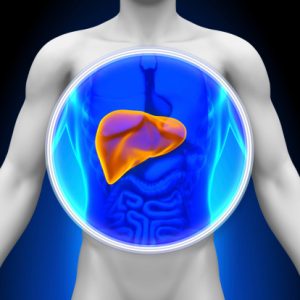 Research suggests that up to 25 percent of Americans suffer from fatty liver disease, which causes an enlarged liver or, as it is known in medical terms, hepatomegaly. Essentially, it means that the liver is swollen beyond normal size. Since the liver has more than one important function, getting treatment for hepatomegaly is vital.
Research suggests that up to 25 percent of Americans suffer from fatty liver disease, which causes an enlarged liver or, as it is known in medical terms, hepatomegaly. Essentially, it means that the liver is swollen beyond normal size. Since the liver has more than one important function, getting treatment for hepatomegaly is vital.
Our liver helps clean our blood by removing harmful chemicals that our bodies make. It creates liquid bile, which helps break down fat in food. It also stores sugar, also referred to as glucose. Glucose gives us energy whenever we need it. When a person has an enlarged liver and doesn’t get treated properly, long-term damage can occur.
What can cause an enlarged liver (hepatomegaly)?
Advertisement
Some enlarged liver causes are more common than others. For example, alcoholic liver disease is a frequent cause for enlarged liver symptoms. Viral hepatitis, which includes hepatitis A, B, C, D, or E can lead to an enlarged liver, too. Cancer can also be a factor. It can spread to the liver from a different organ.
Studies show that overmedicating or using medication in an improper fashion can be a contributor to liver damage, so it is important to follow prescription instructions carefully.
Research indicates that some less common liver diseases may contribute to an enlarged liver, and some diseases that impact other organs but indirectly involve the liver may lead to liver swelling.
Here are some of the indirect factors that could impact the liver:
- Some types of leukemia
- Some types of lymphoma
- Multiple myeloma
- Genetic diseases (Wilson’s disease, Gaucher’s disease, glycogen storage diseases)
- Heart and blood vessel problems
- Infections (liver abscess, relapsing fever)
- Liver damage from toxins
- Complex liver and systemic diseases (amyloidosis, autoimmune hepatitis, primary biliary cirrhosis, primary sclerosing cholangitis)
A poor diet can put people at risk of getting nonalcoholic fatty liver disease. A fatty liver is just as it sounds – too much fat in liver cells. What happens is that fatty tissue builds up in the liver when an individual’s diet exceeds the amount of fat their body can really handle. When fat makes up at least 5 percent of the liver, you have a fatty liver. A little fat in the liver doesn’t necessarily lead to liver damage. It becomes a problem if the buildup is simple fat. The buildup of simple fat can lead to inflammation and even scarring of the liver.
Medical researchers have said if current trends continue, nonalcoholic fatty liver disease in the United States will increase 50 percent by the year 2030.
Hepatomegaly risk factors
Risk factors for hepatomegaly include both genetic and lifestyle factors. Genetic risk factors include autoimmune disorders, inflammatory bowel disease, chronic liver disease, liver cancers, sickle cell disease, and obesity.
Lifestyle factors include excessive alcohol consumption, habits that increase your risk for HIV and hepatitis like tattoos, intravenous drug use, blood transfusions, and unprotected sex.
Symptoms that occur with enlarged liver (hepatomegaly)
 When someone experiences fatty liver disease, sometimes there are no symptoms, other times people have reported fatigue, weakness, and mild abdominal discomfort. Since the excess fat causes inflammation, appetite can disappear, thus leading to weight loss and weakness.
When someone experiences fatty liver disease, sometimes there are no symptoms, other times people have reported fatigue, weakness, and mild abdominal discomfort. Since the excess fat causes inflammation, appetite can disappear, thus leading to weight loss and weakness.
Here are some other symptoms that people with enlarged livers (hepatomegaly) may experience:
- Pain in the upper right belly
- Muscle aches
- Nausea
- Jaundice (yellowing of skin)
- Abdominal swelling or bloating
- Bleeding gums
- Bloody stool or clay-colored stool
- Diarrhea
There are other enlarged liver symptoms that are less common, but still do occur is some people. Those symptoms include,
, itchy skin, and loss of body hair, irregular menstruation, red palms, and red skin lesions.
Enlarged liver (hepatomegaly) diagnosis and treatment options
Unfortunately, an enlarged liver may go unnoticed for some time. When a person first feels symptoms, a doctor will likely do a physical exam, which includes pressing on the right side of the belly to feel the size of the liver and determine whether there is any tenderness. Enlarged liver diagnosis requires a closer look at the liver. This could include an ultrasound, a CT scan, and/or an MRI. In some cases, an ERCP is used. This is a special scope that checks for any problems in the tubes that carry bile. Samples of the liver cell can also be taken to check for fatty liver disease or cancer.
Enlarged liver or hepatomegaly treatment varies depending on the cause. Common causes of the condition, such as alcoholic hepatitis and nonalcoholic fatty liver disease, tend to get better with improvements in lifestyle – alcohol abstinence and healthy eating.
With hepatitis A, treatment to help fight off infection and keep the body hydrated is usually needed. If cirrhosis of the liver is an issue, medications may help control the amount of protein absorbed in the diet. Additionally, water pills may be required to minimize water retention. People with enlarged livers who experience fluid buildup in their abdominal cavity may have to get the fluid removed with a needle and syringe from time to time.
Liver transplants are an option in cases where the liver fails. According to the Columbia University Department of Surgery, there are about 17,000 Americans waiting for a liver transplant.
Enlarged liver (hepatomegaly) prevention tips
Advertisement
 Of course, no one wants to get to the point where they need an organ transplant. As mentioned earlier, the liver is a vital organ, one we can’t take for granted. Being kind to our bodies can help keep our liver healthy. To reduce your risk of an enlarged liver, follow the tips below:
Of course, no one wants to get to the point where they need an organ transplant. As mentioned earlier, the liver is a vital organ, one we can’t take for granted. Being kind to our bodies can help keep our liver healthy. To reduce your risk of an enlarged liver, follow the tips below:
- Eat healthy – fruit, vegetables, and whole grains.
- Drink alcohol in moderation.
- Limit contact with medications.
- Limit contact with chemicals.
- Maintain a reasonable, healthy weight.
Next to our skin, the liver is our largest organ. Without a liver, we would not be able to process nutrients, including carbohydrates, proteins, fats, vitamins, and minerals. Our bodies would not be able to get rid of toxins and our blood would not clot properly. The liver is a vulnerable part of us, so being aware of what can cause enlarged liver and how to treat our liver can keep us on a healthy road.
Also read:
